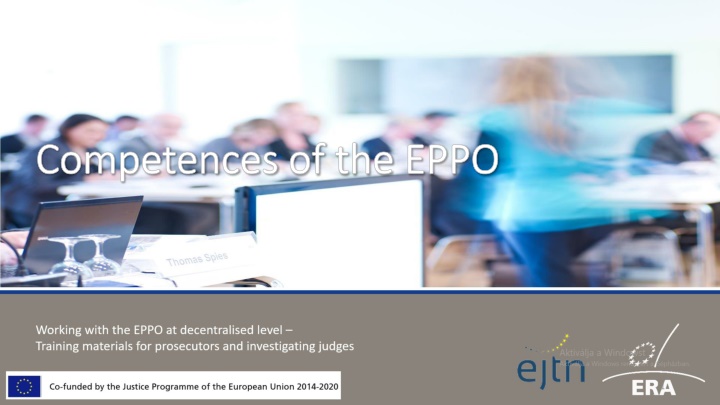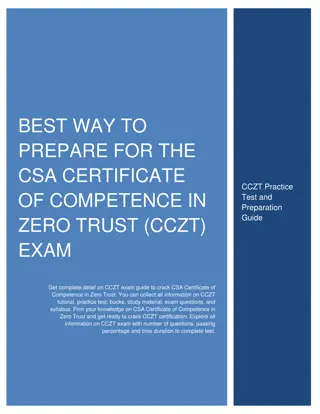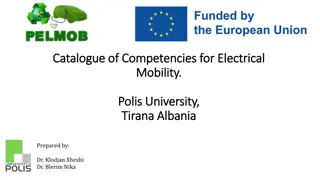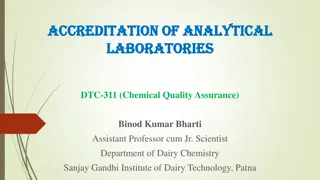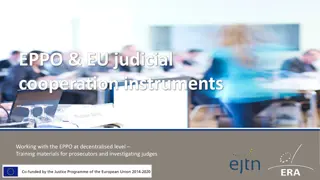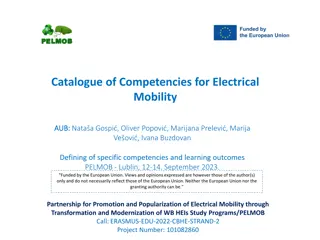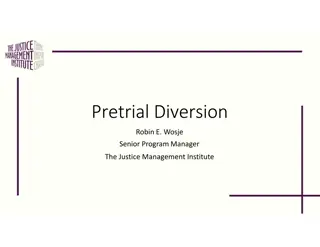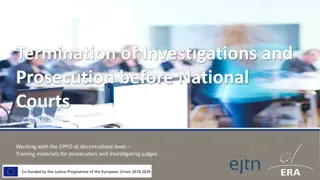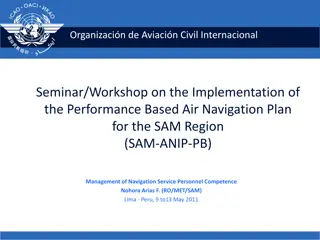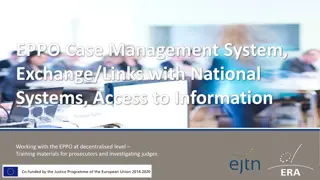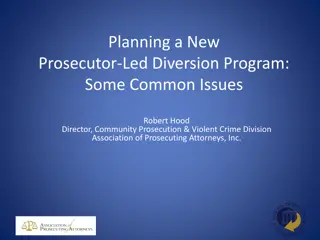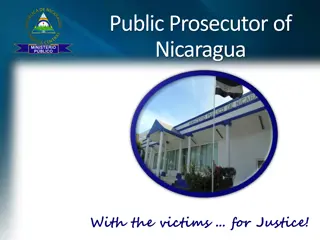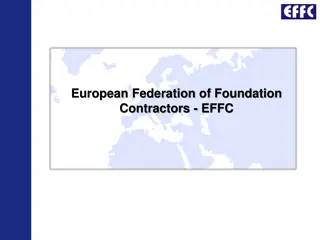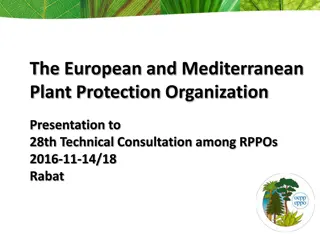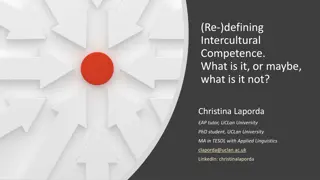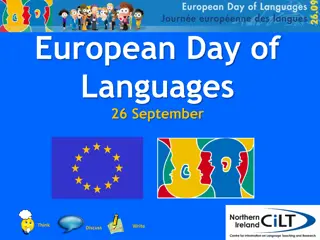European Public Prosecutor's Office (EPPO) Competence Overview
The European Public Prosecutor's Office (EPPO) has territorial and personal competence in investigating criminal offenses affecting the Union's financial interests. This includes offenses across multiple Member States with significant financial damage. The EPPO also handles offenses related to participation in criminal organizations. The material competence of the EPPO involves adherence to specific regulations and reporting obligations, with an emphasis on cross-border investigations and interaction with national authorities.
Download Presentation

Please find below an Image/Link to download the presentation.
The content on the website is provided AS IS for your information and personal use only. It may not be sold, licensed, or shared on other websites without obtaining consent from the author.If you encounter any issues during the download, it is possible that the publisher has removed the file from their server.
You are allowed to download the files provided on this website for personal or commercial use, subject to the condition that they are used lawfully. All files are the property of their respective owners.
The content on the website is provided AS IS for your information and personal use only. It may not be sold, licensed, or shared on other websites without obtaining consent from the author.
E N D
Presentation Transcript
Competences Competences of of the the EPPO EPPO 1
REGULATIONS COUNCIL REGULATION (EU) 2017/1939 of 12 October 2017 implementing enhanced cooperation on the establishment of the European Public Prosecutor s Office ( the EPPO ) DIRECTIVE (EU) 2017/1371 OF THE EUROPEAN PARLIAMENT AND OF THE COUNCIL of 5 July 2017 on the fight against fraud to the Union's financial interests by means of criminal law 2
Content of the module Material competence of the EPPO Territorial and personal competence of the EPPO Information channels and reporting obligations Right of evocation 3
Learning objectives/interactive activity Knowledge of the legal frameworks relevant for the investigation of the offences falling under the competence of the EPPO Understanding of the tasks of EPPO according to the EPPO regulation, its provisions concerning the exercise of EPPO s material, territorial and personal competence, issues concerning cross-border investigations and the choice of forum. Interaction with national authorities and the exercise of the right of evocation and disagreements between the EPPO and national authorities. Practical case study to deepen the knowledge treated in the PPP. 4
Overview Overview Material competence of the EPPO Territorial and personal competence of the EPPO Information channels and reporting obligations Right of evocation 5
Material Material competence competence I I. . Article 22 1. The EPPO shall be competent in respect of the criminal offences affecting the financial interests of the Union that are provided for in Directive (EU) 2017/1371, as implemented by national law, irrespective of whether the same criminal conduct could be classified as another type of offence under national law. As regards offences referred to in point (d) of Article 3(2) of Directive (EU) 2017/1371, as implemented by national law, the EPPO shall only be competent when the intentional acts or omissions defined in that provision are connected with the territory of two or more Member States and involve a total damage of at least EUR 10 million. The EPPO shall also be competent for offences regarding participation in a criminal organisation as defined in Framework Decision 2008/841/JHA, as implemented in national law, if the focus of the criminal activity of such a criminal organisation is to commit any of the offences referred to in paragraph 1. The EPPO shall also be competent for any other criminal offence that is inextricably linked to criminal conduct that falls within the scope of paragraph 1 of this Article. The competence with regard to such criminal offences may only be exercised in conformity with Article 25(3). In any case, the EPPO shall not be competent for criminal offences in respect of national direct taxes including offences inextricably linked thereto. The structure and functioning of the tax administration of the Member States shall not be affected by this Regulation. 2. 3. 4. 6
Material Competence II Material Competence II Article 22 1 3 2 Criminal Organisation If related to PIF offences Inextricably linked Offences PIF Offences Directive (EU) 2017/1371 (PIF) Minimum rules concerning the definition of criminal offences and sanctions with regard to combatting fraud and other illegal activities affecting the Union's financial interests (the Union budget), Definitions regarding Fraud affecting the Union's financial interests Other criminal offences affecting the Union's financial interests 7
Material Competence III Material Competence III PIF Offences PIF Offences Fraud affecting the Union's financial interests (Article 3 PIF) Precisely defined actions concerning non-procurement-related expenditure, procurement-related expenditure revenue not arising from VAT revenue arising from VAT If the acts are connected to the territory of at least 2 MS/ total damage at least EUR 10 000 000 no competence if damage is less than EUR 10 000 000 (Article 22 4) Other criminal offences affecting the Union's financial interests (Article 4 PIF) Money laundering as described in Article 1 3 of Directive (EU) 2015/849 Passive and active corruption Misappropriation 8
Material Competence IV Material Competence IV PIF Offences PIF Offences Double-checking of material competence PIF-directive is direct applicable procedural law seen from the perspective of the material competence of the EPPO PIF-directive has to be implemented into the substantive criminal law of the respective MS Double-Check 1. Check: Does an individual act fall within the scope of the PIF-directive? If no, EPPO (of course) cannot exercise its competence Even not, if the MS has extended the directive ( gold-plating ) e.g. misapplication of assets concerning procured related expenditures without damage to financial interests (see Article 3/2/b/iii PIF) 2. Check: the substantive criminal law of the respective MS Examination of the national provisions If the respective MS has failed to amend its national law in the relevant question, EPPO cannot exercise its competence 9
Material Competence Material Competence V V Criminal Organisation Organisation Criminal Participation in a criminal organisation as defined in Framework Decision 2008/841/JHA, as implemented in national law, criminal organisation means a structured association, established over a period of time, of more than two persons acting in concert with a view to committing offences which are punishable by deprivation of liberty or a detention order of a maximum of at least four years or a more serious penalty, to obtain, directly or indirectly, a financial or other material benefit; structured association means an association that is not randomly formed for the immediate commission of an offence, nor does it need to have formally defined roles for its members, continuity of its membership, or a developed structure. if the focus of the criminal activity of such a criminal organisation is to commit any PIF offence 10
Material Competence Material Competence VI VI Inextricably linked offences linked offences Inextricably Concurrence of offences Criminal action falls both within the scope of the PIF-directive and a (different) national provision The identity of the material facts or facts which are substantially the same (recital 54), linked together in time and space ne bis in idem (e.g. ECJ 18 July 2007, C-288/05, Kretzinger ECLI:EU:C:2007:441) Comparison of maximum sanctions (Article 35 3/a) Competence carried out only if maximum penalty for the PIF offence is higher than for the inextricably linked offence. Ancillary/instrumental Offence (recital 56) Offence committed for the main purpose of creating the conditions to commit the offence affecting the financial interests of the Union (ancillary offence). No comparison of maximum sanctions (Article 25 3/a) 11
Material Competence Material Competence VII linked offences linked offences VII Inextricably Inextricably Examples Public official uses assets contrary to the purpose for which they were intended in a way which damages the Union's financial interests by issuing a false decision. PIF-offence (Art 4 3 PIF-directive) and national offence (e.g.) abuse of office Comparison of maximum sentences Fraudulently luring out money in order to bribe a EU agent who is approving subsidies fraud = ancillary/instrumental offence No comparison of maximum sentences 12
Material Competence VIII Material Competence VIII exceptions exceptions Article 25 2. Where a criminal offence that falls within the scope of Article 22 caused or is likely to cause damage to the Union s financial interests of less than EUR 10 000, the EPPO may only exercise its competence if: (a) the case has repercussions at Union level which require an investigation to be conducted by the EPPO; or (b) officials or other servants of the Union, or members of the institutions of the Union could be suspected of having committed the offence. The EPPO shall, where appropriate, consult the competent national authorities or bodies of the Union to establish whether the criteria set out in points (a) and (b) of the first subparagraph are met. 3. The EPPO shall refrain from exercising its competence in respect of any offence falling within the scope of Article 22 and shall, upon consultation with the competent national authorities, refer the case without undue delay to the latter in accordance with Article 34 if: (a) the maximum sanction provided for by national law for an offence falling within the scope of Article 22(1) is equal to or less severe than the maximum sanction for an inextricably linked offence as referred to in Article 22(3) unless the latter offence has been instrumental to commit the offence falling within the scope of Article 22(1); or (b) there is a reason to assume that the damage caused or likely to be caused, to the Union s financial interests by an offence as referred to in Article 22 does not exceed the damage caused, or likely to be caused to another victim. Point (b) of the first subparagraph of this paragraph shall not apply to offences referred to in Article 3(2)(a), (b) and (d) of Directive (EU) 2017/1371 as implemented by national law. 4. The EPPO may, with the consent of the competent national authorities, exercise its competence for offences referred to in Article 22 in cases which would otherwise be excluded due to application of paragraph 3(b) of this Article if it appears that the EPPO is better placed to investigateor prosecute. 13
Material Competence IX Material Competence IX exceptions exceptions Exceptions and counter exceptions from exercising competence (Art. 25) Petty cases (damage less than EUR 10 000), unless Repercussions at Union level Officials etc of the Union suspected Inextricably linked offences, comparison of sanctions, unless Ancillary/instrumental offence Damage to the EU financial interests does not exceed the damage caused to another victim, unless Fraud concerning expenditures (Art. 3/2/a and b PIF) Cross-border fraudulent schemes concerning VAT (Art. 3/2/d PIF) In other cases with consent of competent national authorities EPPO may exercise its competence 14
Exercise of material competence of the EPPO Exercise of material competence of the EPPO PIF-related organised crime (Art. 22 2) Inextricably linked offence (Art. 22 3) PIF offence (Art. 22 1) Reason to assume that EU damage does not exceed other damage? (Art. 25 3 b) If revenue related w/o VAT yes Focus of criminal activity to commit PIF offences? Ancillary offence Ne bis in idem no yes EU damage more than 10.000 ? (Art. 25 2) Consent with national authorities (Art. 25 4) Maximum penalty for PIF offence higher than linked offence? (Art. 25 3 a) no EU repercussions or EU officials suspected? yes yes yes yes EPPO may exercise competence 15
Material Competence X Material Competence X Disagreements Disagreements Article 25 6. In the case of disagreement between the EPPO and the national prosecution authorities over the question of whether the criminal conduct falls within the scope of Article 22(2), or (3) or Article 25(2) or (3), the national authorities competent to decide on the attribution of competences concerning prosecution at national level shall decide who is to be competent for the investigation of the case. Member States shall specify the national authority which will decide on the attribution of competence. 16
Material Competence Material Competence XI XI Disagreements Disagreements National authorities to settle disagreements between EPPO and national prosecution authorities concerning following issues (Art. 25 6) Organised Crime and the focus of activity (Art. 22 2) Inextricable linked offence including the comparison of sanctions (Art. 22 3, Art. 25 3/a) Petty Cases (Art. 25 2) Comparison of damages to the EU and to other victims (Art. 25 3/b) National authority specified by the MS (e.g. Prosecutor General) No competence for the MS to decide whether an action is a PIF- offence or not (Art. 22 1) 17
Territorial and personal competence I Territorial and personal competence I Article 23 The EPPO shall be competent for the offences referred to in Article 22 where such offences: (a) were committed in whole or in part within the territory of one or several Member States; (b) were committed by a national of a Member State, provided that a Member State has jurisdiction for such offences when committed outside its territory, or (c) were committed outside the territories referred to in point (a) by a person who was subject to the Staff Regulations or to the Conditions of Employment, at the time of the offence, provided that a Member State has jurisdiction for such offences when committed outside its territory. 18
Territorial and personal competence II Territorial and personal competence II Article 23: Offences committed Within the territory of one or several MS (whole or partly) By a national of a MS Provided that an MS has jurisdiction for such offences when committed outside its territory, or Outside the territory of an MS, but committed by a person who is subject to the Staff Regulation of Officials or to the Conditions of Employment, Provided that anMS has jurisdiction for such offences when committed outside its territory. 19
Territorial and personal competence III Territorial and personal competence III Examples: Fraudulently luring out EU funds by a citizen of a non-MS EPPO may exercise its competence In Hungary living Austrian, misapplying EU funds Austria = participating MS Austria has jurisdiction over its citizens for crimes committed outside its territory EPPO may exercise its competence 20
Information Channels/Reporting Information Channels/Reporting obligations obligations Article 24 1. The institutions, bodies, offices and agencies of the Union and the authorities of the Member States competent under applicable national law shall without undue delay report to the EPPO any criminal conduct in respect of which it could exercise its competence in accordance with Article 22, Article 25(2) and (3). 2. When a judicial or law enforcement authority of a Member State initiates an investigation in respect of a criminal offence for which the EPPO could exercise its competence in accordance with Article 22, Article 25(2) and (3), or where, at any time after the initiation of an investigation, it appears to the competent judicial or law enforcement authority of a Member State that an investigation concerns such an offence, that authority shall without undue delay inform the EPPO so that the latter can decide whether to exercise its right of evocation in accordance with Article 27. 3. When a judicial or law enforcement authority of a Member State initiates an investigation in respect of a criminal offence as defined in Article 22 and considers that the EPPO could, in accordance with Article 25(3), not exercise its competence, it shall inform the EPPO thereof. 4. The report shall contain, as a minimum, a description of the facts, including an assessment of the damage caused or likely to be caused, the possible legal qualification and any available information about potential victims, suspects and any other involved persons. 5. The EPPO shall also be informed, in accordance with paragraphs 1 and 2 of this Article, of cases where an assessment of whether the criteria in Article 25(2) are met is not possible. 21
Information Channels/Reporting Information Channels/Reporting obligations obligations Article 24 6. Information provided to the EPPO shall be registered and verified in accordance with its internal rules of procedure. The verification shall assess whether, on the basis of the information provided in accordance with paragraphs 1 and 2, there are grounds to initiate an investigation or to exercise the right of evocation. 7. Where upon verification the EPPO decides that there are no grounds to initiate an investigation in accordance with Article 26, or to exercise its right of evocation in accordance with Article 27, the reasons shall be noted in the case management system. The EPPO shall inform the authority that reported the criminal conduct in accordance with paragraph 1 or 2, as crime victims and if so provided by national law, other persons who reported the criminal conduct. well as 8. Where it comes to the knowledge of the EPPO that a criminal offence outside of the scope of the competence of the EPPO may have been committed, it shall without undue delay inform the competent national authorities and forward all relevant evidence to them. 9. In specific cases, the EPPO may request further relevant information available to the institutions, bodies, offices and agencies of the Union and the authorities of the Member States. The requested information may concern infringements which caused damage to the Union s financial interests, other than those within the competence of the EPPO in accordance with Article 25(2). 10. The EPPO may request other information in order to enable the College, in accordance with Article 9(2), to issue general guidelines on the interpretation of the obligation to inform the EPPO of cases falling within the scope of Article 25(2). 22
Information channels (Article 24) Information channels (Article 24) European level National level Art. 22, 25/2 and 3 Judicial and law enforcement agencies EU Institutions etc. Administrative Authorities OLAF No Eppo- competence Art. 24/8 EPPO Handling EDP Central Office Initiating investigation Art. 26/1 Evocation Art. 27/1 and 5 23
Reporting obligations Reporting obligations Without undue delay No matter if the national authority has already initiated investigations or not Even of exceptional cases under Art 25 3 or of cases where an assessment of whether the criteria in Article 25(2) are met is not possible. Minimum requirements (Art. 24 4) description of the facts assessment of the damage caused or likely to be caused possible legal qualification information about potential victims, suspects and any other involved persons. 24
Right of evocation I Right of evocation I Article 27: 1. Upon receiving all relevant information in accordance with Article 24(2), the EPPO shall take its decision on whether to exercise its right of evocation as soon as possible, but no later than 5 days after receiving the information from the national authorities and shall inform the national authorities of that decision. The European Chief Prosecutor may in a specific case take a reasoned decision to prolong the time limit by a maximum period of 5 days, and shall inform the national authorities accordingly. During the periods referred to in paragraph 1, the national authorities shall refrain from taking any decision under national law that may have the effect of precluding the EPPO from exercising its right of evocation. The national authorities shall take any urgent measures necessary, under national law, to ensure effective investigation and prosecution. If the EPPO becomes aware, by means other than the information referred to in Article 24(2), of the fact that an investigation in respect of a criminal offence for which it could be competent is already undertaken by the competent authorities of a Member State, it shall inform these authorities without delay. After being duly informed in accordance with Article 24(2), the EPPO shall take a decision on whether to exercise its right of evocation. The decision shall be taken within the time limits set out in paragraph 1 of this Article. The EPPO shall, where appropriate, consult the competent authorities of the Member State concerned before deciding whether to exercise its right of evocation. Where the EPPO exercises its right of evocation, the competent authorities of the Member States shall transfer the file to the EPPO and refrain from carrying out further acts of investigation in respect of the same offence. 2. 3. 4. 5. 6. 25
Right of evocation II Right of evocation II Article 27: 6. The right of evocation set out in this Article may be exercised by a European Delegated Prosecutor from any Member State whose competent authorities have initiated an investigation in respect of an offence that falls within the scope of Articles 22 and 23. Where a European Delegated Prosecutor, who has received the information in accordance with Article 24(2), considers not to exercise the right of evocation, he/she shall inform the competent Permanent Chamber through the EuropeanProsecutor of his/her Member State with a view to enabling the Permanent Chamber to take a decision in accordance with Article 10(4). Where the EPPO has refrained from exercising its competence, it shall inform the competent national authorities without undue delay. At any time in the course of the proceedings, the competent national authorities shall inform the EPPO of any new facts which could give the EPPO reasons to reconsider its decision not to exercise competence. The EPPO may exercise its right of evocation after receiving such information, provided that the national investigation has not already been finalised and that an indictment has not been submitted to a court. The decision shall be taken within the time limit set out in paragraph 1. Where, with regard to offences which caused or are likely to cause damage to the Union s financial interests of less than EUR 100 000, the College considers that, with reference to the degree of seriousness of the offence or the complexity of the proceedings in the individual case, there is no need to investigate or to prosecute at Union level, it shall in accordance with Article 9(2), issue general guidelines allowing the European Delegated Prosecutors to decide, independently and without undue delay, not to evoke the case. The guidelines shall specify, with all necessary details, the circumstances to which they apply, by establishing clear criteria, taking specifically into account the nature of the offence, the urgency of the situation and the commitment of the competent national authorities to take all necessary measures in order to fully recover the financial interests. To ensure coherent application of the guidelines, a European Delegated Prosecutor shall inform the competent Permanent Chamber of each decision taken in accordance with paragraph 8 and each Permanent Chamber shall report annually to the College on the application of the guidelines. 7. 8. damage to the Union s 9. 26
Right of evocation III Right of evocation III Decision to take the case by the handling EDP Not later than 5 days after receiving the information in accordance with Article 24 2 (10 days upon decision of the ECP) Decision not to evoke the case Report to the Permanent Chamber which can instruct the EDP to decide otherwise General guidelines issued by the College if damage is less than EUR 100 000 27
